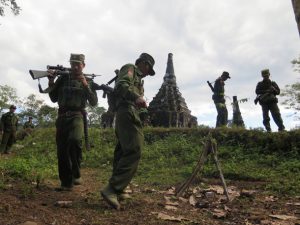Hope for a “Second Panglong” Shrinks as Conflict in Shan State Worsens
By Burma Partnership • June 8, 2016 On 1 June, 2016, representatives from various political parties and civil society organizations in Shan State gathered in attempt to build consensus among the region’s diverse ethnic groups before the launch of the “second Panglong” conference tentatively planned for July of this year. The upcoming conference derives its name from the original 1947 Panglong Agreement, which promised autonomy for the Kachin, Chin and Shan ethnic groups in exchange for their support of General Aung San and the move towards independence from Britain. The State Counselor, Daw Aung San Suu Kyi’s, proposal for a second Panglong comes in the context of an intensification of conflict in Shan State, and a desperate need for peace and the implementation of a truly nationwide ceasefire, not only in Shan State, but also throughout the country.
On 1 June, 2016, representatives from various political parties and civil society organizations in Shan State gathered in attempt to build consensus among the region’s diverse ethnic groups before the launch of the “second Panglong” conference tentatively planned for July of this year. The upcoming conference derives its name from the original 1947 Panglong Agreement, which promised autonomy for the Kachin, Chin and Shan ethnic groups in exchange for their support of General Aung San and the move towards independence from Britain. The State Counselor, Daw Aung San Suu Kyi’s, proposal for a second Panglong comes in the context of an intensification of conflict in Shan State, and a desperate need for peace and the implementation of a truly nationwide ceasefire, not only in Shan State, but also throughout the country.
According to the Shan Human Rights Foundation (SHRF), in the month of May 2016 the Burma Army “has committed grave human rights violations, which meet the definition of war crimes, during a new offensive against the Shan State Progress Party/Shan State Army.” In their statement, the SHRF documented the human rights violations that occurred during the month of May, which included: 43 villagers who had been used as human shields, five who had been subjected severe torture and at least three who had been murdered. In addition, frequent aerial bombardments, skirmishes and the mass deployment of troops by the Burma Army have contributed to ongoing instability in Shan State. Yet in a statement posted on Facebook upon the completion of an EU mission in Shan State, EU Ambassador Roland Kobia remarked that “We hope that the conflict parties in Shan State will soon lay down their arms and return to the negotiating table.” Clearly, blame is being shifted away from the biggest contributor to the conflict in Shan State – the Burma Army. The fact-finding mission was also criticized for not exposing the involvement of the Burma Army in human rights violations and ongoing atrocities during the conflict in Shan State.
Divisions among ethnic armed groups in Shan State are also obstacles in the peace process and a lasting settlement that can result from the second Panglong. Non-signatories to the Nationwide Ceasefire Agreement (NCA), such as the Ta’ang National Liberation Army (the armed wing of the Palaung State Liberation Front) have a significantly different perspective on the peace process than groups that have signed the NCA, like the Shan State Army-South (the armed wing of the Restoration Council of Shan State – RCSS). The Burma Army has also frequently been accused of fueling ethnic tension by siding with the RCSS, further stoking ethnic divisions in Shan State. This divide has been particularly prominent in recent weeks, with conflict intensifying in northern Shan State. A lack of political will within the Burma Army to engage in a genuine dialogue – as opposed to conflict – with non-signatories to the NCA also poses an obstacle to peace negotiations.
The upcoming 5th Anniversary of continuous armed conflict in Kachin State on June 9th should serve as a powerful warning for the peace process under Daw Aung San Suu Kyi. In both the Kachin and Shan State conflicts, the violence committed by the Burma Army appears to be a common thread. The National League for Democracy-led Government must attempt to exercise its civilian authority over the Burma Army if it wishes to end armed conflicts and hostilities in ethnic regions and to build trust with all ethnic nationalities in its peacebuilding efforts. The international community, including donors such as the EU, can support the peace process by condemning the role of the Burma Army in aggravating ethnic divisions and prolonging conflict and suffering in ethnic regions.
Tags: Burma Partnership, Kachin State, Military Engagement, National League for Democracy, Nationwide Ceasefire Agreement, Shan State, Shan State Progress PartyThis post is in: Blog
Related PostsBurma Partnership Celebrates Continuing Regional Solidarity for Burma and Embraces the Work Ahead for Progressive Voice
Burma Army Displays Blatant Disregard for 21st Century Panglong Peace Process
Ann Din Coal Power Plant: Local Movement and Action to Preserve and Protect Natural Resources and Land: Mon IDP Report Case Study #4
Latest Human Rights Abuse Case Demonstrates Urgent Need to Reform the Myanmar National Human Rights Commission
Human Rights Far From Guaranteed as US Sanctions on Burma Are Removed









 All posts
All posts